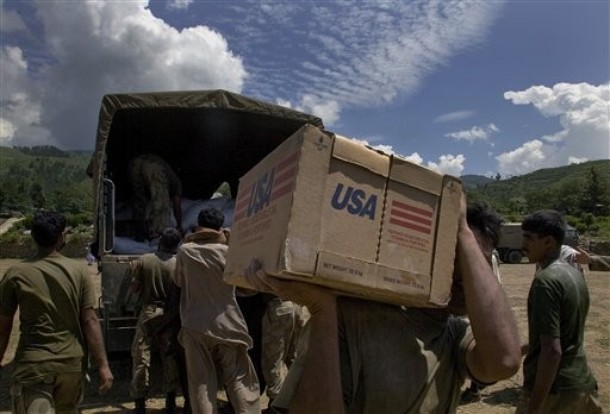
In Pakistan, following the catastrophic flooding that literally is drowning an entire nation, could things get much worse? Unfortunately, last week, things did.
While trivial by comparison with the human suffering, several snapshots portray the level of poisons within the U.S.-Pakistani relationships as well as with other friends and would-be Pakistani benefactors that could be toxic.
Pakistan is designated and supposed to be a major U.S. non-NATO ally. Last week, a Pakistani military delegation led by a brigadier general was escorted off a United Airlines flight at Washington’s Dulles International Airport bound for Tampa, Fla., where the group was to meet with U.S. Central Command officials, and detained for several hours.
Apparently, after a long flight to the United States and a delay in takeoff for Tampa, the brigadier made what he believed to be a humorous remark hoping this was his final flight of the day.
The remark was misinterpreted by the cabin crew and by a passenger who became “uncomfortable” flying on the same aircraft with these obvious non-Americans. Although possessing valid identification cards and passports and a letter of invitation from CENTCOM, representatives of the Transportation Security Administration were unconvinced and held the delegation in camera for several hours. Once released, the delegation angrily canceled its visit, returned home and the Pakistan government rightly fired off a strong protest.
Imagine if this had happened to a U.S. general and delegation in an Arab or Muslim country. To paraphrase Ronald Reagan’s quip years ago on what he thought was a dead mike that “we begin bombing (Russia) in 5 minutes,” what might our reaction have been? And what gossip will be going round the Pakistani officer’s mess at general headquarters in Rawalpindi about America?
More devastating, however, was the scandal over allegations of bribery on the part of the Pakistani cricket team now playing test matches in England.
Americans don’t appreciate the passion of Pakistanis over cricket and the role it plays in that society. Combine the World Series, Super Bowl, NBA playoffs, the U.S. tennis and golf opens and the Kentucky Derby and you get the idea.
While Pakistani High Commissioner to the United Kingdom Wajid Shamsul Hasan first suggested this might have been a sting commissioned by one of Britain’s scandal sheets, the Pakistani public was shocked rigid by this revelation and national morale punctured as much as the citizens of New Orleans would have been dispirited had the Saints been crushed in the last Super Bowl 100-0 instead of winning and lifting the mood of that Katrina-ravaged city.
Finally, it was reported in Dawn, one of Pakistan’s leading newspapers, that British offers of sending army personnel to assist in the flood relief effort was turned down on the basis of retaliation against the remarks made in August by U.K. Prime Minister David Cameron, then visiting India, about Pakistan’s commitment to fighting the insurgency inferring that it continued aiding Taliban fighting in Afghanistan against NATO and coalition forces. The accuracy of this story hasn’t been confirmed.
And in another piece, Pakistan was reported as turning down aid from its neighbor and historical bete noir India, a story heatedly rejected by Pakistan’s President Asif Zardari.
Of course, these events are microscopic compared with the destruction and the challenges and tests that lie ahead in coping with many tens of millions of homeless and helpless Pakistanis and rebuilding homes, farms, bridges and morale. In this regard, the worst is yet to come. As a very senior Pakistani official who is intimately involved in these matters put it, “the magnitude of the devastation caused by the flood can potentially trigger dire political and economic crises in the country.”
For the time being, Pakistan is in a state of collective shock. Survival is the overriding priority for huge slices of its public. Aid hasn’t been forthcoming in levels that are needed and may not be. Too many people, including Pakistanis, believe that without complete transparency and accountability or a trustworthy means of distributing aid, much or most of the funds will line pockets and not feed people or rebuild towns and cities.
Leadership both within our major non-NATO ally and in the United States is essential. It is no accident that U.S. President Barack Obama has yet to speak with Zardari about what needs to be done a month and a half after the floods began. And Zardari needs to impose his will on a weak and fragile coalition government with opposition parties more interested in scoring political points and increasing influence rather than working for the good of the nation — a daunting challenge in the extreme.
Poisons in these complicated relationships are present and are growing as the image of snakes on a plane alludes. They are dangerous. They must not be allowed to become deadly.
Harlan Ullman is Senior Advisor at the Atlantic Council, Chairman of the Killowen Group that advises leaders of government and business, and a frequent advisor to NATO. This article was syndicated by UPI. Photo credit: AP Photo.
Image: 610x_18.jpg
